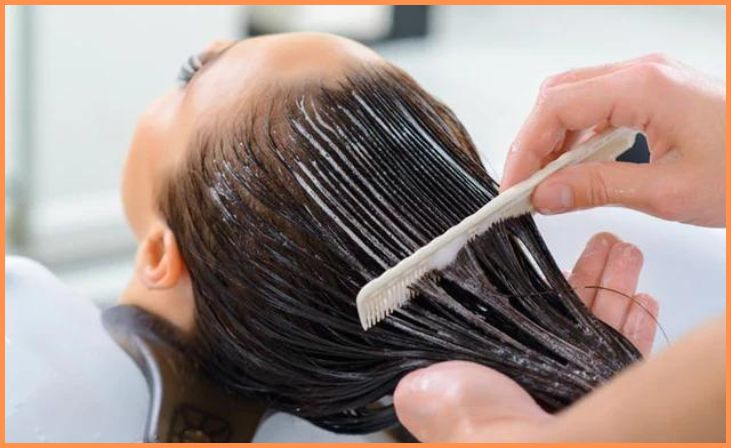As winter sets in, natural hair faces unique challenges such as dryness, breakage, and frizz due to harsh weather conditions. It becomes crucial to adopt a proactive approach to maintain the health and vitality of your natural locks during the colder months. In this guide, we’ll explore practical tips to protect natural hair in winter, focusing on key areas like moisture retention, protective styling, scalp care, and product selection. By incorporating these strategies into your hair care routine, you can ensure that your natural curls and coils remain resilient, hydrated, and vibrant throughout the winter season. Embracing these practices will not only shield your hair from the harsh elements but also promote a flourishing and confident natural hair journey.
Tips To Protect Natural Hair In Winter
Deep Condition Regularly

Deep condition your natural hair weekly to combat winter dryness. This restores moisture, preventing breakage caused by cold air. Choose a hydrating treatment and leave it on for the recommended time. The deep conditioning process nourishes your hair, keeping it soft and resilient against the harsh winter elements.
Moisturize Daily
Daily moisturizing is crucial for protecting natural hair in winter. Use a leave-in conditioner or moisturizing cream to combat dryness and maintain hydration. Apply a small amount evenly throughout your hair, focusing on the ends. This routine helps prevent breakage, split ends, and keeps your hair supple. Additionally, consider a water-based spritz for a quick moisture boost on-the-go. Consistent daily moisturizing ensures your hair remains resilient and retains moisture, combating the drying effects of winter weather.
Protective Styles
Embrace protective styles like braids, twists, or buns to shield natural hair during winter. These styles minimize exposure to cold air and reduce friction against scarves or jackets that can cause breakage. Choose styles that keep the ends tucked away, promoting moisture retention. Prioritize low-manipulation styles that require minimal daily styling to minimize stress on the hair. Protective styles not only safeguard your hair from the harsh elements but also simplify your winter hair care routine. Remember to moisturize and maintain these styles to keep your hair healthy and protected throughout the colder months.
Limit Heat Styling
During winter, limit heat styling to protect natural hair from dryness and damage. Excessive use of flat irons, curling irons, and blow dryers can contribute to brittle hair. When heat styling is necessary, use a heat protectant spray to minimize damage. Opt for air-drying whenever possible to reduce exposure to direct heat. Embrace heat-free styles like braids or twists to maintain your hair’s health. This approach helps retain moisture, preventing winter-induced dryness and breakage. Prioritize protective techniques that enhance your hair’s resilience, allowing it to thrive despite the colder weather conditions.
Satin or Silk Scarves and Pillowcases

Opt for satin or silk scarves and pillowcases to protect natural hair in winter. Unlike cotton, these smooth materials reduce friction, preventing hair breakage and moisture loss. Satin or silk scarves provide a protective barrier against harsh winds and help maintain your hair’s moisture levels. Similarly, using satin or silk pillowcases reduces friction while you sleep, preventing tangles and preserving your hairstyle. This simple switch in fabric can contribute to healthier, more hydrated hair during the winter months, promoting overall hair health and minimizing the impact of cold, dry air on your natural locks.
Protect Your Hair From the Elements
Shield your natural hair from winter elements by wearing hats or headscarves. These accessories act as a barrier against harsh winds, snow, and rain, preventing moisture loss and damage. Choose styles that cover your hair without causing friction. Additionally, consider applying a layer of leave-in conditioner before heading out for added protection. This creates a barrier against the elements, keeping your hair hydrated and resilient. Whether it’s a stylish hat or a cozy headwrap, incorporating protective accessories is a practical and fashionable way to safeguard your natural hair from the potentially damaging effects of winter weather.
Trim Regularly
Regular trims are essential for protecting natural hair in winter. Schedule periodic cuts to eliminate split ends and prevent breakage, ensuring your hair stays healthy and resilient. Cold weather can exacerbate dryness and lead to increased breakage, making routine trims crucial for maintaining overall hair health. Trimming removes damaged ends, preventing splits from traveling up the hair shaft. Aim for a trim every 8-12 weeks or as needed based on your hair’s condition. Keeping your hair well-maintained through regular trims helps it withstand winter challenges, promoting a vibrant and robust natural hair texture.
Use a Humidifier

Combat winter dryness by using a humidifier to protect natural hair. Indoor heating systems can strip moisture from the air, contributing to dry hair and scalp. A humidifier adds moisture back into your living space, helping to maintain optimal humidity levels for your hair. This prevents excessive dryness, breakage, and frizz caused by low humidity. Run the humidifier in frequently used rooms, especially where you sleep, to create a more humid environment. This simple addition to your routine can make a significant difference in preserving the moisture balance of your natural hair during the winter months.
Gentle Detangling
Practice gentle detangling to protect your natural hair during winter. Use a wide-tooth comb or your fingers to detangle, starting from the tips and working your way up. Applying a leave-in conditioner or detangling spray can aid in smooth combing and reduce breakage. Winter dryness makes hair more susceptible to tangles, so patience is key. Divide your hair into sections and detangle one section at a time. If you encounter stubborn knots, use your fingers to gently separate them before using a comb. This approach minimizes stress on your hair, promoting healthier and more manageable natural curls during the colder months.
Stay Hydrated
Maintain natural hair health in winter by staying hydrated. Drinking an adequate amount of water nourishes your hair from the inside out, combating dryness and promoting overall vitality. Proper hydration helps prevent a dry scalp and brittle hair, common concerns during colder months. Aim for at least eight glasses of water a day, and consider incorporating water-rich foods into your diet. Hydration supports your hair’s elasticity and strength, making it more resilient to winter-related challenges. So, keep a water bottle handy and prioritize hydration for vibrant and well-moisturized natural hair, even in the dry winter weather.
Conclusion
In conclusion, safeguarding your natural hair in winter is a commitment to its health and beauty. By prioritizing moisture, adopting protective styles, and making mindful product choices, you can overcome the seasonal challenges. Remember, consistency is key, and a holistic approach, including scalp care, lifestyle considerations, and the right products, will keep your curls flourishing. As you embrace these tips, enjoy the journey of nurturing your natural hair, ensuring it remains resilient, vibrant, and stunning, no matter the weather.
FAQs
Winter weather can strip natural hair of moisture, leading to dryness, breakage, and frizz. Protecting your natural hair during winter helps maintain its health, moisture balance, and overall vitality.
Consider deep conditioning your natural hair once a week during the winter months. This helps replenish moisture, repair damage, and keep your curls hydrated and resilient.







